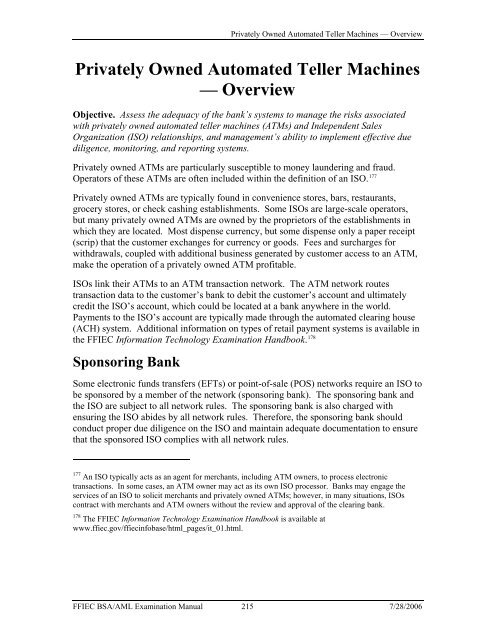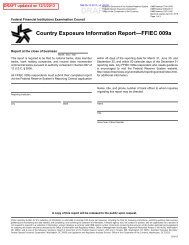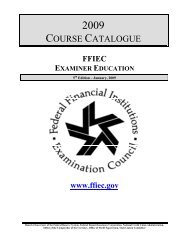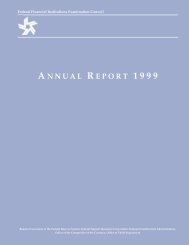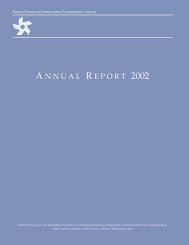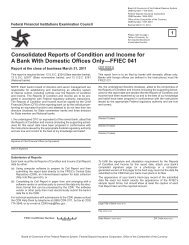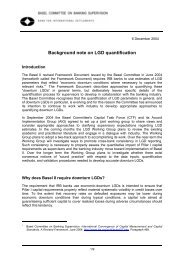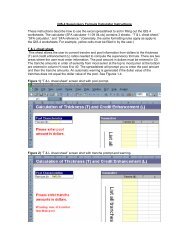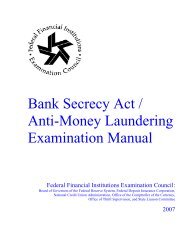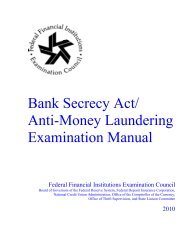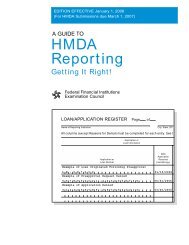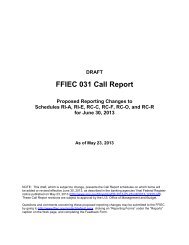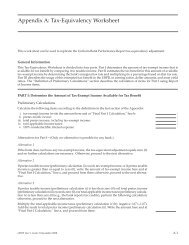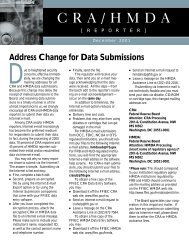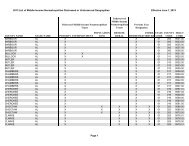- Page 1 and 2:
Bank Secrecy Act / Anti-Money Laund
- Page 3 and 4:
Table of Contents Examination Proce
- Page 5 and 6:
INTRODUCTION Introduction This Fede
- Page 7 and 8:
Background Introduction In 1970, Co
- Page 9 and 10:
U.S. Treasury Introduction The BSA
- Page 11 and 12:
Introduction international narcotic
- Page 13 and 14:
Introduction Other legitimate sourc
- Page 15 and 16:
Scoping and Planning — Overview C
- Page 17 and 18:
Scoping and Planning — Overview T
- Page 19 and 20:
Scoping and Planning — Examinatio
- Page 21 and 22:
Scoping and Planning — Examinatio
- Page 23 and 24:
BSA/AML Risk Assessment — Overvie
- Page 25 and 26:
BSA/AML Risk Assessment — Overvie
- Page 27 and 28:
• High Intensity Financial Crime
- Page 29 and 30:
Examiner Development of a BSA/AML R
- Page 31 and 32:
BSA/AML Risk Assessment — Examina
- Page 33 and 34:
BSA/AML Compliance Program — Over
- Page 35 and 36:
BSA/AML Compliance Program — Over
- Page 37 and 38:
BSA/AML Compliance Program — Over
- Page 39 and 40:
BSA/AML Compliance Program — Exam
- Page 41 and 42:
BSA/AML Compliance Program — Exam
- Page 43 and 44:
Independent Testing BSA/AML Complia
- Page 45 and 46:
Developing Conclusions and Finalizi
- Page 47 and 48:
Developing Conclusions and Finalizi
- Page 49 and 50:
Customer Identification Program —
- Page 51 and 52:
Customer Information Required Custo
- Page 53 and 54:
Customer Identification Program —
- Page 55 and 56:
Customer Identification Program —
- Page 57 and 58:
Transaction Testing Customer Identi
- Page 59 and 60:
Customer Identification Program —
- Page 61 and 62:
Customer Due Diligence — Overview
- Page 63 and 64:
Customer Due Diligence — Examinat
- Page 65 and 66:
Suspicious Activity Reporting — O
- Page 67 and 68:
Suspicious Activity Reporting — O
- Page 69 and 70:
Law Enforcement Inquiries and Reque
- Page 71 and 72:
Suspicious Activity Reporting — O
- Page 73 and 74:
Suspicious Activity Reporting — O
- Page 75 and 76:
Suspicious Activity Reporting — E
- Page 77 and 78:
Suspicious Activity Reporting — E
- Page 79 and 80:
Suspicious Activity Reporting — E
- Page 81 and 82:
CTR Backfiling Currency Transaction
- Page 83 and 84:
Currency Transaction Reporting —
- Page 85 and 86:
Annual Review Currency Transaction
- Page 87 and 88:
Currency Transaction Reporting Exem
- Page 89 and 90:
Currency Transaction Reporting Exem
- Page 91 and 92:
Information Sharing — Overview wi
- Page 93 and 94:
Information Sharing — Overview ap
- Page 95 and 96:
Examination Procedures Information
- Page 97 and 98:
Information Sharing — Examination
- Page 99 and 100:
Contemporaneous Purchases Purchase
- Page 101 and 102:
Purchase and Sale of Monetary Instr
- Page 103 and 104:
Responsibilities of Originator’s
- Page 105 and 106:
Funds Transfers Recordkeeping — O
- Page 107 and 108:
Funds Transfers Recordkeeping — O
- Page 109 and 110:
Foreign Correspondent Account Recor
- Page 111 and 112:
Foreign Correspondent Account Recor
- Page 113 and 114:
Foreign Correspondent Account Recor
- Page 115 and 116:
Foreign Correspondent Account Recor
- Page 117 and 118:
Foreign Correspondent Account Recor
- Page 119 and 120:
Foreign Correspondent Account Recor
- Page 121 and 122:
Foreign Correspondent Account Recor
- Page 123 and 124:
Private Banking Due Diligence Progr
- Page 125 and 126:
Private Banking Due Diligence Progr
- Page 127 and 128:
Private Banking Due Diligence Progr
- Page 129 and 130:
Private Banking Due Diligence Progr
- Page 131 and 132:
Special Measures — Overview minim
- Page 133 and 134:
Examination Procedures Special Meas
- Page 135 and 136:
Foreign Bank and Financial Accounts
- Page 137 and 138:
International Transportation of Cur
- Page 139 and 140:
Office of Foreign Assets Control
- Page 141 and 142:
Office of Foreign Assets Control
- Page 143 and 144:
Office of Foreign Assets Control
- Page 145 and 146:
Office of Foreign Assets Control
- Page 147 and 148:
Office of Foreign Assets Control
- Page 149 and 150:
Office of Foreign Assets Control
- Page 151 and 152:
Enterprise-Wide BSA/AML Compliance
- Page 153 and 154:
Enterprise-Wide BSA/AML Compliance
- Page 155 and 156:
Enterprise-Wide BSA/AML Compliance
- Page 157 and 158:
Enterprise-Wide BSA/AML Compliance
- Page 159 and 160:
Foreign Branches and Offices of U.S
- Page 161 and 162:
Foreign Branches and Offices of U.S
- Page 163 and 164:
Foreign Branches and Offices of U.S
- Page 165 and 166:
Examination Procedures Parallel Ban
- Page 167 and 168: Correspondent Accounts (Domestic)
- Page 169 and 170: Correspondent Accounts (Domestic)
- Page 171 and 172: large currency transactions. Corres
- Page 173 and 174: Correspondent Accounts (Foreign)
- Page 175 and 176: Correspondent Accounts (Foreign)
- Page 177 and 178: U.S. Dollar Drafts — Overview U.S
- Page 179 and 180: U.S. Dollar Drafts — Examination
- Page 181 and 182: Payable Through Accounts — Overvi
- Page 183 and 184: Payable Through Accounts — Examin
- Page 185 and 186: Payable Through Accounts — Examin
- Page 187 and 188: Risk Mitigation Pouch Activities
- Page 189 and 190: Pouch Activities — Examination Pr
- Page 191 and 192: Electronic Banking — Overview lin
- Page 193 and 194: Funds Transfers — Overview Funds
- Page 195 and 196: Funds Transfers — Overview • Di
- Page 197 and 198: Risk Mitigation Funds Transfers —
- Page 199 and 200: Funds Transfers — Examination Pro
- Page 201 and 202: Automated Clearing House Transactio
- Page 203 and 204: Automated Clearing House Transactio
- Page 205 and 206: Transaction Testing Automated Clear
- Page 207 and 208: Electronic Cash — Overview Using
- Page 209 and 210: Third-Party Payment Processors —
- Page 211 and 212: Third-Party Payment Processors —
- Page 213 and 214: Purchase and Sale of Monetary Instr
- Page 215 and 216: Brokered Deposits — Overview Brok
- Page 217: Examination Procedures Brokered Dep
- Page 221 and 222: Privately Owned Automated Teller Ma
- Page 223 and 224: Privately Owned ATMs — Examinatio
- Page 225 and 226: Nondeposit Investment Products —
- Page 227 and 228: Nondeposit Investment Products —
- Page 229 and 230: Nondeposit Investment Products —
- Page 231 and 232: Insurance — Overview Insurance
- Page 233 and 234: • The identification of high-risk
- Page 235 and 236: Insurance — Examination Procedure
- Page 237 and 238: Concentration Accounts — Overview
- Page 239 and 240: Lending Activities — Overview Len
- Page 241 and 242: Examination Procedures Lending Acti
- Page 243 and 244: Trade Finance Activities — Overvi
- Page 245 and 246: Trade Finance Activities — Overvi
- Page 247 and 248: Private Banking — Overview Privat
- Page 249 and 250: Private Banking — Overview allow
- Page 251 and 252: • The current source of funds for
- Page 253 and 254: Examination Procedures Private Bank
- Page 255 and 256: Trust and Asset Management Services
- Page 257 and 258: Trust and Asset Management Services
- Page 259 and 260: Trust and Asset Management Services
- Page 261 and 262: Nonresident Aliens and Foreign Indi
- Page 263 and 264: Nonresident Aliens and Foreign Indi
- Page 265 and 266: Politically Exposed Persons — Ove
- Page 267 and 268: Risk Factors Politically Exposed Pe
- Page 269 and 270:
Politically Exposed Persons — Exa
- Page 271 and 272:
Embassy and Foreign Consulate Accou
- Page 273 and 274:
Embassy and Foreign Consulate Accou
- Page 275 and 276:
Non-Bank Financial Institutions —
- Page 277 and 278:
Non-Bank Financial Institutions —
- Page 279 and 280:
Non-Bank Financial Institutions —
- Page 281 and 282:
Professional Service Providers —
- Page 283 and 284:
Professional Service Providers —
- Page 285 and 286:
Non-Governmental Organizations and
- Page 287 and 288:
Non-Governmental Organizations and
- Page 289 and 290:
Business Entities (Domestic and For
- Page 291 and 292:
Business Entities (Domestic and For
- Page 293 and 294:
Business Entities (Domestic and For
- Page 295 and 296:
Business Entities (Domestic and For
- Page 297 and 298:
Cash-Intensive Businesses — Overv
- Page 299 and 300:
Appendix A: BSA Laws and Regulation
- Page 301 and 302:
Appendix A: BSA Laws and Regulation
- Page 303 and 304:
Appendix A: BSA Laws and Regulation
- Page 305 and 306:
Appendix B: BSA/AML Directives Appe
- Page 307 and 308:
Web Sites Appendix C: BSA/AML Refer
- Page 309 and 310:
• Federal Register notices. • E
- Page 311 and 312:
Appendix D: Statutory Definition of
- Page 313 and 314:
Appendix E: International Organizat
- Page 315 and 316:
Appendix F: Money Laundering and Te
- Page 317 and 318:
Appendix F: Money Laundering and Te
- Page 319 and 320:
Appendix F: Money Laundering and Te
- Page 321 and 322:
Appendix F: Money Laundering and Te
- Page 323 and 324:
Appendix G: Structuring Appendix G:
- Page 325 and 326:
Appendix H: Request Letter Items (C
- Page 327 and 328:
Appendix H: Request Letter Items (C
- Page 329 and 330:
Purchase and Sale of Monetary Instr
- Page 331 and 332:
Appendix H: Request Letter Items (C
- Page 333 and 334:
Appendix H: Request Letter Items (C
- Page 335 and 336:
Automated Clearing House Transactio
- Page 337 and 338:
Appendix H: Request Letter Items (C
- Page 339 and 340:
Appendix H: Request Letter Items (C
- Page 341 and 342:
Nonresident Aliens and Foreign Indi
- Page 343 and 344:
Cash-Intensive Businesses Appendix
- Page 345 and 346:
Appendix J: Quantity of Risk Matrix
- Page 347 and 348:
Appendix J: Quantity of Risk Matrix
- Page 349 and 350:
Appendix L: SAR Quality Guidance Ap
- Page 351 and 352:
Appendix M: Quantity of Risk Matrix
- Page 353 and 354:
Appendix N: Private Banking — Com
- Page 355 and 356:
Appendix O: Examiner Tools for Tran
- Page 357 and 358:
Appendix P: BSA Record Retention Re
- Page 359 and 360:
• Name of purchaser. • Date of
- Page 361 and 362:
Appendix P: BSA Record Retention Re
- Page 363 and 364:
Acronym or abbreviation Full name A
- Page 365 and 366:
Acronym or abbreviation Full name I
- Page 367:
Acronym or abbreviation Full name R


